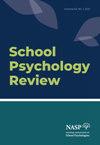Epistemological Diversity, Constructionism, and Social Justice Research in School Psychology
IF 3
3区 心理学
Q1 Social Sciences
引用次数: 3
Abstract
Abstract Calls for school psychology researchers to produce scholarship explicitly centered on social justice have grown in recent years. There is a growing community of scholars dedicated to this research area but the knowledge base produced so far remains narrow and constrained in nature. We connect the constrained nature of this scholarship to the epistemological dominance of objectivism which has manifested in many ways, including calls to standardize the meaning of social justice. Social justice researchers must produce their research (whether qualitative, quantitative, or mixed) within the confines of objectivist culture even though social injustice exceeds the constraints of any one epistemological framework. We argue that in order to foster social justice research in school psychology, a plurality of epistemologies is crucial. We present the epistemology of constructionism, and provide various examples of what an epistemologically diversified approach to school psychology research, practice and teaching in social justice may look like. Impact Statement The authors critique the restrictive role of objectivism in social justice-related research in school psychology. This paper can assist the field of school psychology to broaden its epistemological boundaries through constructionism which in turn can allow equity-oriented school psychologists to have a deeper engagement with issues of power, inequity, and injustice in research, practice, and teaching.学校心理学的认识论多样性、建构主义与社会正义研究
近年来,越来越多的人呼吁学校心理学研究人员拿出明确以社会正义为中心的学术成果。致力于这一研究领域的学者群体越来越多,但迄今为止产生的知识库仍然狭窄,性质有限。我们将这一学术的受约束性质与客观主义的认识论主导联系起来,客观主义在许多方面表现出来,包括呼吁规范社会正义的含义。社会正义研究人员必须在客观主义文化的范围内进行研究(无论是定性的、定量的还是混合的),即使社会不公正超过了任何一个认识论框架的限制。我们认为,为了促进学校心理学中的社会正义研究,多元的认识论是至关重要的。我们介绍了建构主义的认识论,并提供了各种例子,说明在社会正义中,学校心理学研究、实践和教学的认识论多元化方法可能是什么样子的。影响声明作者批评了客观主义在学校心理学中与社会正义相关的研究中的限制作用。本文可以通过建构主义来帮助学校心理学领域拓宽其认识论边界,这反过来又可以让以公平为导向的学校心理学家在研究、实践和教学中更深入地参与权力、不公平和不公正的问题。
本文章由计算机程序翻译,如有差异,请以英文原文为准。
求助全文
约1分钟内获得全文
求助全文
来源期刊

School Psychology Review
Social Sciences-Education
CiteScore
6.90
自引率
20.00%
发文量
54
期刊介绍:
School Psychology Review (SPR) is a refereed journal published quarterly by NASP. Its primary purpose is to provide a means for communicating scholarly advances in research, training, and practice related to psychology and education, and specifically to school psychology. Of particular interest are articles presenting original, data-based research that can contribute to the development of innovative intervention and prevention strategies and the evaluation of these approaches. SPR presents important conceptual developments and empirical findings from a wide range of disciplines (e.g., educational, child clinical, pediatric, community.
 求助内容:
求助内容: 应助结果提醒方式:
应助结果提醒方式:


